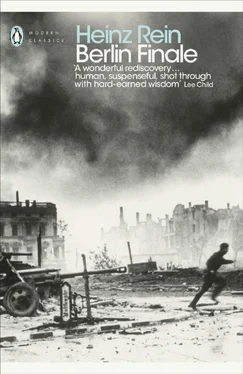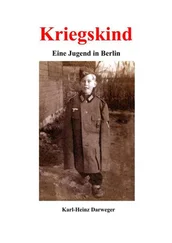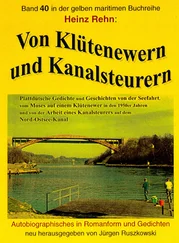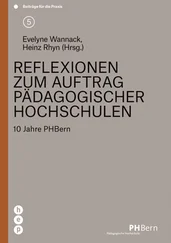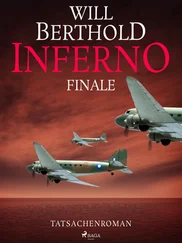‘And what do you do when the siren goes off?,’ Lassehn asks.
‘Corpses on leave, waiting for the undertaker,’ Mrs Buschkamp goes on. ‘How they can bear it…’
‘Well, they do bear it,’ Lassehn objects.
‘I’m an old woman,’ Mrs Buschkamp replies, ‘nothing throws me these days, and I don’t think my life’s all that valuable, but young women with little children who go to the pub all dolled up as if it was peacetime, they’re the ones who suffer. And believe it or not: the elegant ladies around here sense curse the Americans and the British for daring to drop bombs on us. The Nazis aren’t to blame, and the Führer will soon show them.’ Mrs Buschkamp breaks off. ‘There it goes, the cuckoo!’
‘I beg your pardon?,’ Lassehn asks. ‘The cuckoo? What cuckoo?’
Mrs Buschkamp looks at him uncomprehendingly.
‘I only arrived in Berlin yesterday,’ Lassehn apologizes, ‘hence my ignorance.’
‘There’s something not quite right about you, young man,’ says Mrs Buschkamp, and narrows her eyes, ‘but for now I’ve got no time to put my finger on it. You see, there goes the anti-aircraft radio station again.’
Three notes issue from the speaker, always the same three notes: it is the feared triad of death. And then another voice is heard, not the practised voice of the radio announcer, but the harsh, clipped voice of an officer.
‘Attention, attention, gun position of the Berlin anti-aircraft unit. Here is a report about the situation in the air. The spearhead of the large unit of hostile bomber planes is now heading eastward towards Magdeburg-Stendal. The mass of the large enemy formation is following in the areas between Magdeburg-Braunschweig and Hanover-Braunschweig. Public air-raid warnings are being given for the western territory of the Reich capital.’
‘The fat’s in the fire,’ Mrs Buschkamp says furiously.
Lassehn has been temporarily diverted from the question that burns inside him, but now he advances towards it again. ‘You wanted to answer another question for me, Mrs Buschkamp,’ he remembers.
‘Really, did I?’ Mrs Buschkamp asks back.
‘Yes,’ Lassehn says firmly, ‘the question of why Miss Niedermeyer, Irma, as you call her, married young Lassehn out of nowhere, you hinted a moment ago that you had guessed the reason.’
Mrs Buschkamp comes very close to Lassehn, who is standing behind a chair and holding on tightly to its back. ‘That’s a question of conscience, Mr Kempner, and one that interests you a great deal. But as you claim to be a friend of Lassehn’s, I’ll tell you so that you can tell the lad. I do the Niedermeyers’ laundry, and it struck me that there was a particular piece of Irma’s laundry that was missing a few times. Do you understand?’
Lassehn looks blankly at Mrs Buschkamp. ‘Quite honestly, no, Mrs Buschkamp,’ he says. ‘What does that have to do with laundry?’
Mrs Buschkamp shakes her head at his naïveté. ‘Well, then I’ll have to make myself quite clear, young man,’ she says. ‘I think that Irma only married that young man, that Lassehn, because she was pregnant by her vanished lover, the captain. So now you know.’
Lassehn seems numb. ‘You think…’
‘I’ve got no time to think,’ Mrs Buschkamp says abruptly. ‘Don’t you hear it? The siren!’
15 April, 11.30 a.m.
The American daylight bombing raid rolls in, above Berlin and the surrounding area. As if on manoeuvres, the squadrons, units, flights, detachments of bombers and fighter planes fly into the territory above Berlin. Conveyor-belt masterpieces of the human brain and human technology, surrounded by the flashes from the anti-aircraft guns and the bursts of fire from the fighters. Flying arsenals whose cannon and machine guns are aimed in such a way that there are no blind spots, and in whose body light- and dark-skinned men are crouched, American students, workers, drugstore salesmen, clerks, farmers, waiting and lying in ambush since the helicopter propellers began to turn on the airfields of Great Britain, and the few seconds in which the object of this hunting raid appears in their sights.
The three million inhabitants of the city are cowering now in cellars and trenches, standing pressed close together in the bunkers and the underground stations of the underground and the S-Bahn, the fire brigades of the city and its greater surroundings are on standby, the fire-fighting teams in the factories have hydrants and grappling irons, picks and axes at the ready, the police are on extreme alert, the Morse machines in the police stations tap away ceaselessly, the barrels of the anti-aircraft guns are aimed steeply at the sky.
In the streets are the empty trams and buses and laden carts whose unyoked horses have been stabled in a hallway.
It is spookily empty and silent, every now and again a motorbike dashes through the silence, the firing from the batteries in the outer air-defence zone roars and thunders. The city has held its breath, the blood is congealing in its veins, its pulses thump anxiously, under a clear blue spring sky with a few white clouds, a deadly feeling of expectation has settled above it.
There it lies now, this great city, 880 square metres, stretching into the landscape of Brandenburg, surrounded for a huge radius by far superior and magnificently armed enemies, and even the sky above it is occupied by hostile forces. Nothing protects it, no hand of God lies protectively over it, no obfuscating cloud, no black dark of night. The many anti-aircraft batteries are no more use than the few fighter squadrons or the many observation posts that stretch from the border of the Reich into the city itself. The anti-aircraft radio stations, the stations of the police and military surveillance report without interruption about the size, course and location of the enemy, they pursue them persistently from square to square on the map. But it all has only a Platonic value because nothing can avert or halt or even delay the attack, unstoppable and undeviating, like a long-distance runner with a stopwatch running around and around a track. The formations follow their own route, they leave white vapour trails in the cloudless sky, they mark out the target area with strange signs that point earthwards like frozen lightning bolts, they open their hatches, the bombs plunge down on houses, stations, factories, streets, bridges, upon the just and the unjust, the living and the unborn. They make the air tremble with explosions, with the cries of stones and people, and the great city lies there helplessly offering itself up to the annihilating blows.
Lassehn sits in the air-raid shelter of number 26 Kaiser-Friedrich-Strasse. He has found a remote corner where barely a beam falls from the lamps, the events around him don’t affect him, he is quite far away, he recognizes every detail, hears every sound, feels the vibrations, but he perceives it all with the indifference of a completely uninvolved bystander. The long shelter is divided into two cellars. Some light bulbs screwed into unshaded fittings give off an unpleasantly bright, cold light among the vaults, benches stand along the walls, bunks stand along the transverse walls, there are also benches between the pillars, later additions. In every gap and corner there are places of all kinds to sit, wicker chairs, leather armchairs, stools, footstools, footrests, couches, sofas, children’s chairs, cane chairs. Along the walls packages are stacked as if in a left-luggage office, black, brown, yellow, grey suitcases made of leather, corduroy, vulcanite, cardboard, some bearing stickers from happier times, ‘Grand Hotel Bellagio’, ‘Hotel Carlton, Budapest’, ‘Bellevue Terminus, Engelberg’, ‘Weisser Hirsch, Schwarzburg’, bulging straw mattresses, rucksacks that looked as if they had been filled for giants, cardboard boxes, boxes of every size, men’s suits, coats, dresses, skirts and jackets, furs hang in a long row from a coat-stand. The cellar is crammed full, every seat is occupied. Back in 1940, when the air raids brought lengthy alarms but caused little damage, going to the air-raid shelter was almost a kind of popular entertainment, card players and discussion groups had met up there, children had opened up playgrounds among the rows of benches, the whole thing had been almost perfectly safe, and almost a way of bringing the members of the house community into contact with each other. The fanfares of special announcements and choruses of ‘ Wir fahren gegen Engelland ’ had thundered from the speakers, a headline from the Völkischer Beobachter had been enough to make them feel that National Socialism’s claim to power was their very own birthright. The enemy air force had been dismissed with a contemptuous shrug, they all thought they could avoid it, and lively discussions had often been held about what was, theoretically, the best place to be. Some maintained you were safest near the entrance to the cellar of the house next door, others closest to the exit, still others thought the wall that formed the foundation of the house facing the courtyard was the best place, while some preferred the seats near the reinforcements of the walls. Opinions were no less different when it came to the course of action to be pursued in the event of danger. While some throw themselves flat on the floor as the bombs approach, others stand up stiffly, in response to the shock waves some quickly exhale all the air in their lungs, while others hold their breath.
Читать дальше
